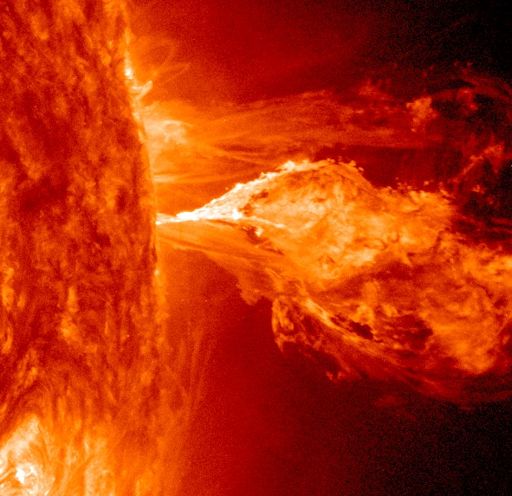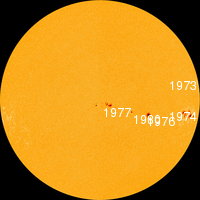
GEOMAGNETIC CALM: Now that effects from the weak CME impact of Feb. 15th have subsided, the forecast calls for calm conditions. NOAA estimates a scant 5% chance of geomagnetic storms on Feb. 17th and 18th. Aurora alerts: text, voice
'RADIOACTIVE' ERUPTION: Today at approximately 04:50 UT, a magnetic filament erupted from the sun's western limb. NASA's Solar Dynamics Observatory captured this high-resolution image of the blast:
Because of its location on the sun's western limb, the eruption did not send a CME toward Earth. However, there was an effect on our planet: Shortwave radio loudspeakers roared with static, an event called a Type II radio burst.
Here's how it works: The explosion sent shock waves rippling through the sun's atmosphere. Those shock waves, in turn, triggered plasma instabilities in the solar corona that emit strong radio emissions. The static-y "roar" of the explosion was picked up by solar observatories and ham radio stations across the dayside of our planet. Based on the sweep of radio frequencies from 20 MHz to 500 MHz, analysts estimate a shock velocity of 776 km/s or 1.7 million mph. That may sound fast, but it is typical for this type of eruption. Solar flare alerts: text, voice

Solar wind
speed: 364.6 km/sec
density: 1.9 protons/cm3
explanation | more data
Updated: Today at 2324 UT
X-ray Solar Flares
6-hr max: C1 2113 UT Feb17
24-hr: C6 0304 UT Feb17
explanation | more data
Updated: Today at: 2300 UT
![]()
Daily Sun: 17 Feb 14
Sunspot AR1977 is crackling with C-class solar flares. All of the other numbered sunspots are quiet. . Credit: SDO/HMI



